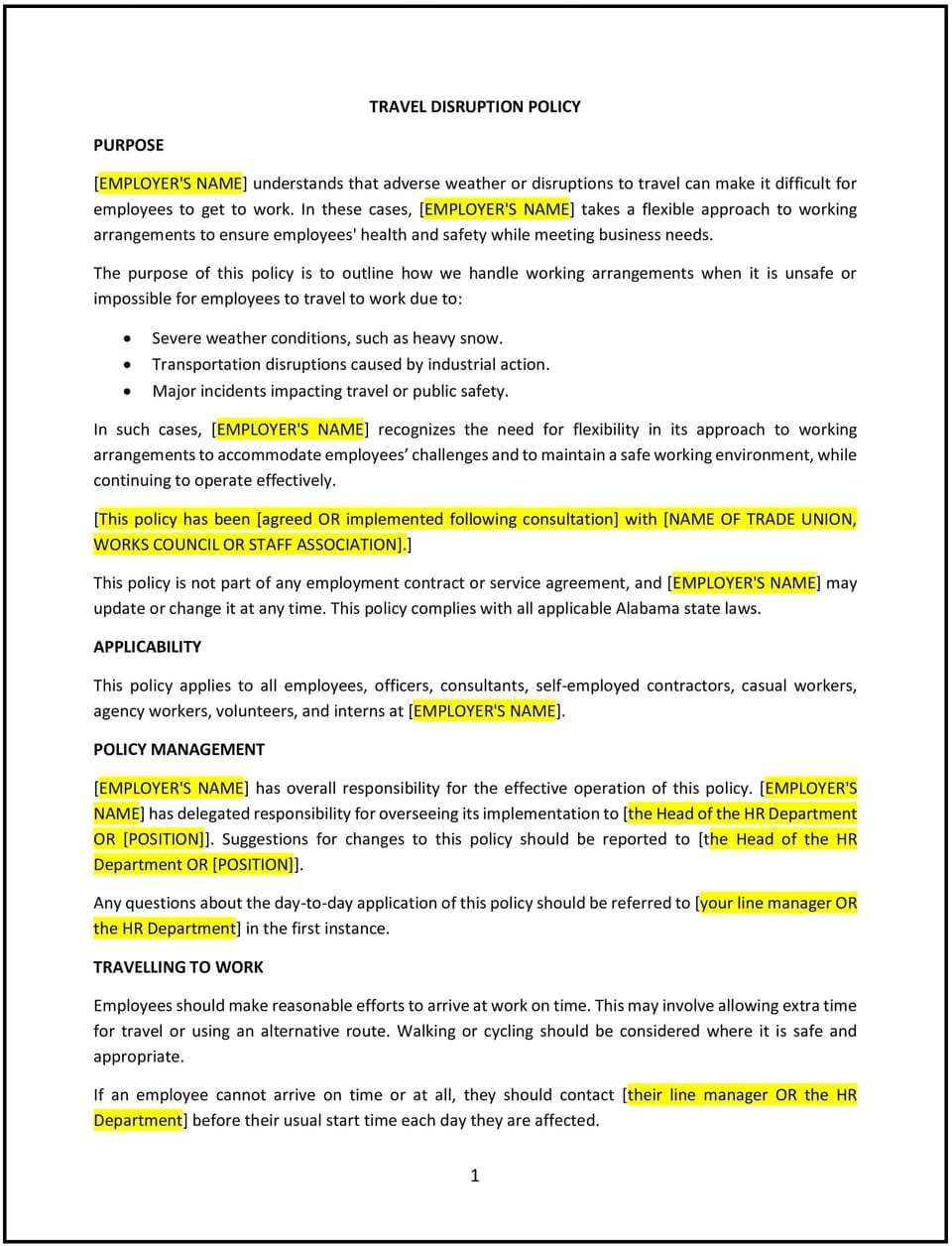Travel disruption policy (Alabama): Free template

Travel disruption policy (Alabama)
A travel disruption policy provides guidance for employees and employers on handling unforeseen issues that interrupt business travel plans. For SMBs in Alabama, this policy ensures clear communication, support, and resolution strategies to minimize the impact of travel disruptions on company operations.
This policy outlines procedures for reporting disruptions, managing additional costs, and ensuring employee safety, fostering a structured and responsive approach to unexpected travel challenges.
How to use this travel disruption policy (Alabama)
- Define travel disruptions: Specify events covered by the policy, such as flight cancellations, delays, severe weather, or emergencies that affect planned business travel.
- Establish reporting procedures: Require employees to report disruptions promptly to their manager or HR, providing details about the situation and its impact on the trip.
- Address alternative arrangements: Include guidelines for rescheduling travel, securing alternative transportation, or extending accommodations as necessary.
- Clarify reimbursement for additional expenses: Specify which costs, such as rebooking fees or unexpected lodging, are eligible for reimbursement and the required documentation.
- Emphasize safety measures: Prioritize employee safety and well-being during travel disruptions, including instructions for contacting emergency services or accessing company resources.
Benefits of using a travel disruption policy (Alabama)
A travel disruption policy ensures preparedness and support during unexpected events. Here’s how it helps:
- Enhances safety: Provides clear protocols to ensure employees’ safety and well-being during travel disruptions.
- Reduces stress: Offers employees guidance and resources to handle unexpected changes with confidence.
- Maintains productivity: Minimizes the operational impact of disruptions by facilitating quick and effective solutions.
- Improves financial control: Outlines eligible expenses and documentation requirements to manage costs transparently.
- Builds trust: Demonstrates the company’s commitment to supporting employees during challenging situations.
Tips for implementing a travel disruption policy (Alabama)
- Provide emergency contacts: Include a list of internal contacts and travel assistance services employees can reach out to during disruptions.
- Use travel insurance: Encourage or require the use of travel insurance to cover unforeseen costs and emergencies.
- Train employees: Educate employees on the policy during onboarding and before any business travel to ensure understanding.
- Monitor travel plans: Use travel management tools to track employee itineraries and stay informed about potential disruptions.
- Evaluate policy effectiveness: Regularly review feedback from employees who experienced disruptions to improve policy provisions.
Q: What types of disruptions are covered by this policy?
A: Covered disruptions include flight cancellations, delays, severe weather, natural disasters, and personal emergencies affecting travel.
Q: What should employees do if their travel plans are disrupted?
A: Employees should contact their manager or HR immediately, provide details of the disruption, and follow the guidance provided for rescheduling or alternative arrangements.
Q: Are additional expenses due to disruptions reimbursed?
A: Yes, reasonable expenses such as rebooking fees, additional lodging, or meals during delays may be reimbursed with proper documentation.
Q: Does the company provide support for personal emergencies during business travel?
A: Yes, the policy includes support for personal emergencies, such as accessing emergency services or arranging return travel.
Q: How does the company prioritize safety during travel disruptions?
A: Employees are encouraged to prioritize their safety, follow local authorities' guidance, and contact company resources or emergency services as needed.
Q: Can employees cancel business trips due to anticipated disruptions?
A: Employees should discuss potential disruptions with their manager or HR in advance, and decisions will be made based on the specific circumstances.
This article contains general legal information and does not contain legal advice. Cobrief is not a law firm or a substitute for an attorney or law firm. The law is complex and changes often. For legal advice, please ask a lawyer.


